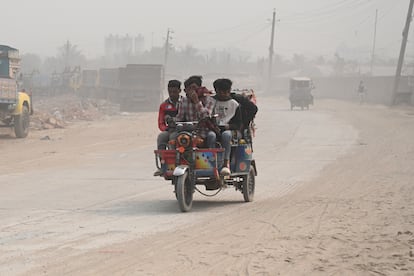Air pollution: Only 5% of countries meet WHO recommendations for fine particles
Bangladesh, Pakistan and India exceed the maximum annual concentration of PM2.5 set by the World Health Organization by more than 10 times


Only seven of the 127 countries analyzed by the Swiss air quality technology company IQAir in 2023 complied with the new safety limits set by the World Health Organization (WHO) for suspended particulate matter smaller than 2.5 microns in diameter (known as PM2.5), a type of particulate matter deriving in part from fossil fuels and linked to around one million premature deaths each year worldwide. That only 5% of the states surveyed now meet these guidelines — which the WHO tightened in 2021 after surveying the scientific literature on the health effects of pollution — demonstrates the huge challenge nations face in making sure their citizens are not exposed to unsafe air.
The seven countries that are below the WHO maximum, set at an annual average of five micrograms per cubic meter (µg/m3), are Australia, Estonia, Finland, Grenada, Iceland, Mauritius, and New Zealand.
At the other extreme — with the worst air quality due to the presence of these small suspended particles — are Bangladesh, which exceeds the WHO recommendation by more than 15 times, Pakistan (14 times more) and India (10 times more). They are followed by Tajikistan, Burkina Faso, Iraq, and the United Arab Emirates, all of which exceed the maximum levels of PM₂,₅ by between 8.5 and 10 times.
In addition to the 127 countries studied, the analysis by the IQAir platform, which has been producing such reports for six years, includes seven other regions and territories associated with other nations. The global picture does not change much by including these regions, as the degree of compliance with the new WHO thresholds for fine particles — which are capable of entering the lungs and even reaching the bloodstream, causing cardiovascular and respiratory diseases — remains very low.
New guidelines adopted by experts three years ago halved the annual exposure considered safe, from 10 to five micrograms per cubic meter. If the previous limits were still maintained, 40 countries and regions would be within the safety margins.
The study also ranks capital cities according to poor air quality. New Delhi, with an annual average concentration of 92.7 micrograms per cubic meter (more than 18 times the recommended level), tops the list. It is followed by the Bangladeshi capital, Dhaka (80.2); Ouagadougou (Burkina Faso) with 46.6; Dushanbe (Tajikistan) with 46; and Baghdad (Iraq) with 45.8. Beyond the capital cities, the Central and South Asia region is home to the 10 most-polluted cities in the world, the report notes.
On the opposite end of the scale, the capitals of Puerto Rico (San Juan), New Zealand (Wellington), Australia (Canberra) and Iceland (Reykjavik) enjoyed the cleanest air in 2023 based solely on the analysis of PM2.5 particles. There are additional types of air pollutants, such as particles smaller than 10 microns (PM10), ozone (O₃) and nitrogen dioxide (NO₂) that are not examined in the IQAir study.
This sixth annual IQAir Global Air Quality Report is based on the analysis of data from more than 30,000 air quality monitoring stations at 7,812 locations in 134 countries, territories, and regions. It uses low-cost air quality meters operated by research institutions, government agencies, universities and educational institutions, NGOs, private companies, and citizen scientists, the study explains.
Countries without monitoring
The authors note that the number of countries and regions with monitoring has been steadily increasing over the past six years, but significant gaps remain. For example, Africa remains the least-represented continent: one-third of the population still lacks access to air quality data. “A clean, healthy, and sustainable environment is a universal human right. In many parts of the world the lack of air quality data delays decisive action and perpetuates unnecessary human suffering. Air quality data saves lives. Where air quality is reported, action is taken, and air quality improves,” Frank Hammes, global CEO of IQAir, said in a statement.
As the experts who produced these reports explain, PM2.5 originates from a wide variety of sources, and among the most common components are sulfates, black carbon, nitrates and ammonium. Among the human-related sources, combustion engines, industrial processes, power generation, wood burning, agricultural activities and construction stand out. Natural sources include sandstorms, forest fires, and dust.
The authors highlight the links between climate change and PM2.5 particulate pollution. “In many regions, intense pollution events coincide with extreme heat, exacerbated by air stagnation events in which weak winds make ground-level ventilation difficult, allowing pollutants to accumulate. As climate change progresses, the frequency of these events is expected to increase.” In addition, the scientists note, “prolonged periods of dry and hot conditions have led to an increase in the frequency and severity of wildfires in many regions.” Therefore, they stress, “it is feasible to address air pollution and climate change objectives simultaneously.”
Sign up for our weekly newsletter to get more English-language news coverage from EL PAÍS USA Edition
Tu suscripción se está usando en otro dispositivo
¿Quieres añadir otro usuario a tu suscripción?
Si continúas leyendo en este dispositivo, no se podrá leer en el otro.
FlechaTu suscripción se está usando en otro dispositivo y solo puedes acceder a EL PAÍS desde un dispositivo a la vez.
Si quieres compartir tu cuenta, cambia tu suscripción a la modalidad Premium, así podrás añadir otro usuario. Cada uno accederá con su propia cuenta de email, lo que os permitirá personalizar vuestra experiencia en EL PAÍS.
¿Tienes una suscripción de empresa? Accede aquí para contratar más cuentas.
En el caso de no saber quién está usando tu cuenta, te recomendamos cambiar tu contraseña aquí.
Si decides continuar compartiendo tu cuenta, este mensaje se mostrará en tu dispositivo y en el de la otra persona que está usando tu cuenta de forma indefinida, afectando a tu experiencia de lectura. Puedes consultar aquí los términos y condiciones de la suscripción digital.








































